Home Tags Posts tagged with "chen guangcheng"
chen guangcheng
Chinese activist Chen Guangcheng has arrived in Taiwan for an 18-day trip that is likely to anger Beijing.
Blind dissident Chen Guangcheng, who arrived on Sunday, is expected to meet opposition lawmakers and discuss human rights in China.
The self-taught lawyer, who is blind, sparked a diplomatic row last year when he escaped house arrest and sought refuge in the US embassy in Beijing.
Chen Guangcheng was eventually allowed to travel to the US to pursue further studies.
China claims sovereignty over Taiwan, although the island has been separately governed since 1949.
Speaking to reporters on Sunday, Chen Guangcheng thanked the Taiwanese public for their concern and support.

Chen Guangcheng has arrived in Taiwan for an 18-day trip that is likely to anger Beijing
“I am impressed by the success of Taiwan’s democracy. Taiwan should be proud of it,” he said, adding that democracy was “an important treasure”.
Chen Guangcheng is scheduled to speak in parliament and meet members of the opposition and human rights groups.
His visit is being hosted by the Association for China Human Rights, which has described it as “a trip for freedom and human rights”.
The group is linked to Taiwan’s political opposition. Chaperoning Chen Guangcheng will be many Taiwan democracy activists and individuals who have criticized China in the past.
According to AP news agency, Taiwanese President Ma Ying-jeou is not scheduled to meet Chen Guangcheng. Ma Ying-jeou has made improving the island’s ties with China one of his key policies.
Chen Guangcheng has been a fellow at New York University (NYU) since mid-2012. He is due to leave the university this month.
The self-taught lawyer, who had campaigned against forced abortions under China’s one-child policy, has linked his departure to “unrelenting pressure” on NYU from Beijing – something NYU roundly denies.
NYU says Chen Guangcheng’s fellowship had always been expected to last a year at most, and that he is in discussions with two other institutions about potential opportunities.
[youtube KPmvkLWH0fE]
Chen Kegui, nephew of blind activist Chen Guangcheng, is being tried in a Chinese court for assaulting local officials who were looking for his uncle.
Chen Guangcheng escaped house arrest earlier this year and then took refuge at the US embassy in Beijing.
After he fled, his relatives’ homes were raided and his nephew, Chen Kegui, was detained by police, who accused him of attacking officials with a knife.
The activist has long expressed fears his relatives would face reprisals.
In the past, China has frequently punished family members of well-known dissidents.
Chen Guangcheng’s escape caused a diplomatic crisis when it emerged that he had taken refuge in the US embassy. It was finally defused after weeks of uncertainty when Chen Guangcheng was allowed to travel to the US for studies.
After he fled from his village, which was being guarded by government-hired guards, his relatives’ homes were raided.

Chen Guangcheng escaped house arrest earlier this year and then took refuge at the US embassy in Beijing
In an interview shortly afterwards, Chen Guangcheng’s brother and sister-in-law described being beaten by local officials.
But the authorities say that Chen Guangcheng’s nephew, Chen Kegui, hacked and wounded officials.
Family members say he acted in self-defence after the officials stormed his home and assaulted his parents.
He was originally charged with “intentional homicide” but the charge was later changed to “intentional injury”.
Human rights groups have expressed concern over whether the nephew will get a fair trial.
Chen Guangcheng, a self-taught lawyer, has campaigned against forced abortions under China’s one-child policy and was jailed for four years in 2006 for disrupting traffic and damaging property.
He was placed under house arrest after his release in 2010.
After he sought refuge in the US embassy, the Chinese authorities allowed him to leave the country with his wife and two children to study at the New York University School of Law.
In August, after meetings in the US Congress, the activist urged Washington to investigate his case and protect his family at home in China’s Shandong province.
Chen Guangcheng said Beijing had not fulfilled guarantees made to him about his own treatment and his family’s security when he left China.
Chinese dissident Chen Guangcheng has arrived in New York with his family to begin a new life in the United States.
The blind human rights lawyer caused a diplomatic crisis when he escaped house arrest to arrive at the US embassy in Beijing last month.
Speaking outside New York University, where he has been offered a fellowship, Chen Guangcheng said China had dealt with the situation with “restraint and calm”.
But he raised concerns about ongoing reprisals against his family.
“Acts of retribution in Shandong have not been abated and my rights to practice law have been curbed – we hope to see a thorough investigation into this,” he said, referring to the province where he was kept under house arrest.
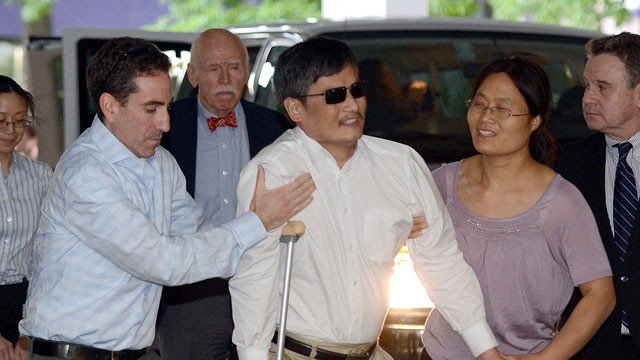
Chinese dissident Chen Guangcheng has arrived in New York with his family to begin a new life in the United States
The activist thanked US officials and his supporters for their help and said he had come to the United States for “recuperation in body and spirit”.
Chen Guangcheng and his family were taken from a Beijing hospital, where he was being treated for a foot injury, to the capital’s airport on Saturday.
After weeks of uncertainty, the activist, his wife Yuan Weijing and their two children, aged eight and six, were handed passports and allowed to fly to Newark, New Jersey, where they arrived soon after 18:00 on Saturday.
Chen Guangcheng spent six days in the US embassy in Beijing last month after escaping house arrest in north-east China, sparking a diplomatic spat between the US and China.
Former House speaker Nancy Pelosi described his arrival in the US as “a milestone in the cause for human rights in China”.
“The courage of Chen Guangcheng to risk his life and livelihood to advocate for disadvantaged people in China is an inspiration to freedom-seeking people around the world,” Nancy Pelosi said.
The Congressional Executive Commission on China, set up to monitor human rights there in 2001, said it remained “deeply concerned that Mr. Chen’s supporters and family members who remain in China face the real threat of retaliation from Chinese officials”.
[youtube Gw9nc1umG28]
Chinese dissident Chen Guangcheng, who was at the centre of a diplomatic crisis with Washington, is on his way to the United States.
The blind activist and his family boarded a flight to Newark, near New York, after being taken from a Beijing hospital to the capital’s airport.
Chen Guangcheng recently spent six days in the US embassy in Beijing after escaping house arrest in north-east China.
He has been offered a fellowship at New York University.
Chen Guangcheng, a self-taught lawyer who campaigned against forced abortions under China’s one-child policy, was jailed for four years in 2006 for disrupting traffic and damaging property, and placed under house arrest after his release in 2010.
Earlier on Saturday, Chen Guangcheng was picked up from the hospital where he was being treated for a foot injury and taken to Beijing airport, along with his wife and two children.
At the airport they were handed passports and allowed to leave. He boarded flight UA88 to Newark, New Jersey, which departed at 17:50, more than two hours late.
“Thousands of thoughts are surging to my mind,” Chen Guangcheng told the Associated Press news agency from the terminal.
Referring to his supporters, he said: “I am requesting a leave of absence, and I hope that they will understand.”
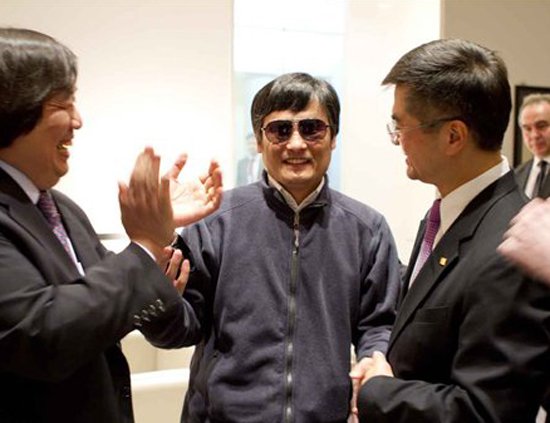
Chinese dissident Chen Guangcheng, who was at the centre of a diplomatic crisis with Washington, is on his way to the United States
The state-run Xinhua news agency said Chen Guangcheng had applied to study abroad “via normal channels in line with the law”.
US state department spokeswoman Victoria Nuland said the administration was looking forward to welcoming Chen Guangcheng to the US, and expressed “appreciation for the manner in which we were able to resolve this matter”.
Bob Fu, president of the US activist group China Aid and a key supporter of Chen Guangcheng, said the dissident was planning to stay in New York for two to three years.
“Of course he wants to spend some time to rest after seven years of brutal treatments at the hands of the Chinese local authorities,” Bob Fu said.
With the activist on his way, both China and the US will want to put this extraordinary diplomatic dispute behind them.
Last month Chen Guangcheng fled from house arrest in Shandong province.
According to media accounts, the blind activist climbed over the wall of the property with the help of his wife late at night.
When he landed on the other side he broke his foot. He is then said to have felt his way in the dark, stumbling and falling, to a nearby village when a friend took him into his home.
He was then driven hundreds of kilometres away to the American embassy. He took refuge there during a visit by US Secretary of State Hillary Clinton, who was in Beijing for high-level talks.
On 2 May, after six days at the embassy, Chen Guangcheng agreed to leave the compound, initially saying he wanted to stay in China.
He was taken to hospital for treatment. During his stay there he called the US Congress twice.
On 3 May Chen Guangcheng pleaded for help to leave China with his family, saying he feared for his safety, and on 16 May he called again, accusing Shandong authorities of harassing his family.
Chen Guangcheng was offered a place to study law at New York University after Beijing said he would be allowed to apply to study abroad.
The US has said visas for Chen Guangcheng and his family are ready.
However the activist has repeatedly warned that his friends and relatives could face reprisals once he has left.
Chinese dissident Chen Guangcheng says he and his family have completed passport applications and officials say they should be ready within 15 days.
The blind activist said officials had helped him fill in the forms on Wednesday at the Beijing hospital where he is staying.
Chen Guangcheng spent six days in the US embassy last month after escaping house arrest.
He wants to leave China and has been offered a place at a US university.
Chen Guangcheng left the US embassy after six days to seek medical treatment but then said that he wanted to go to the US because he feared for his safety.
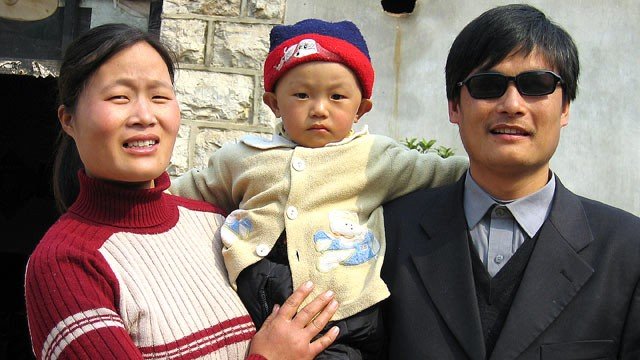
Chen Guangcheng says he and his family have completed passport applications and officials say they should be ready within 15 days
Amid a diplomatic crisis between the US and China over his fate, Chen Guangcheng was offered a place to study law at New York University after Beijing said he would be allowed to apply to study abroad.
The US says the visas for Chen Guangcheng and his family are ready.
Chen Guangcheng said government officials came to see him on Wednesday and completed passport applications for him, his wife and their two children.
He said the officials told him the passport would take 15 days to issue, without giving a definite date.
“People from the immigration administration department have been here. We had our pictures taken and forms filled out. [They said] within 15 days,” Chen Guangcheng said.
“They didn’t promise when we’ll get the passport. They didn’t say anything like we will definitely get the passport on a certain day, etc. There was nothing like that told to us,” he added.
He said he was well, but said doctors had told him he still should not walk because of the foot injury he sustained escaping from house arrest.
Chen Guangcheng and his family are living in the hospital room, and his wife said she was not allowed to leave the hospital freely.
On Tuesday Chen Guangcheng accused local Chinese authorities of harassing his family in his hometown of Dongshigu village, as he spoke via telephone to a US congressional committee.
His nephew, Chen Kegui, has been charged with “intentional homicide” in the wake of Chen Guangcheng’s escape to Beijing.
Liu Weiguo, the lawyer for Chen Kegui, said last week his client was acting in self-defense when he injured three people – none of them critically – who broke into his house on 27 April.
Chen Guangcheng, a self-taught lawyer who campaigned against forced abortions under China’s one-child policy, was himself jailed for four years in 2006 for disrupting traffic and damaging property, and placed under house arrest after his release in 2010.
China says activist Chen Guangcheng can apply to study abroad, potentially indicating a way out of the diplomatic crisis with the US over him.
A Chinese foreign ministry statement said Chen Guangcheng could “apply through normal channels in accordance with the law”.
The blind dissident fled house arrest last month and spent six days inside the US embassy. He left the embassy but now says he wants to go to the US with his family.
His case has overshadowed high-level US-China talks taking place in Beijing.
“If he wishes to study overseas, as a Chinese citizen, he can, like any other Chinese citizens, process relevant procedures with relevant departments through normal channels in accordance to the law,” Xinhua news agency quoted spokesman Liu Weimin as saying
Earlier, China had demanded an apology from the US for sheltering Chen Guangcheng in its embassy.
Despite the apparent change of heart from the government, one human rights lawyer told the Reuters news agency that Chen Guangcheng could still be delayed or prevented from leaving the country.
“This notice from the Ministry of Foreign Affairs is positive news, but how it will play out we don’t know,” Tang Jitian told Reuters.
“For instance, getting the approval for the paperwork to go – there are many potential pitfalls. We can’t be 100% optimistic.”
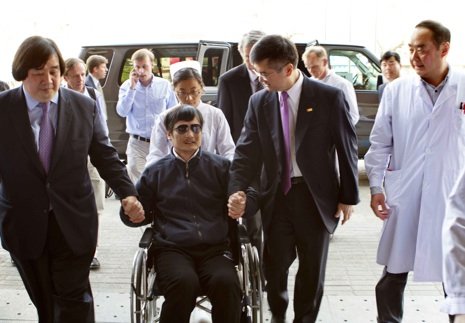
China says activist Chen Guangcheng can apply to study abroad, potentially indicating a way out of the diplomatic crisis with the US over him
Chen Guangcheng is currently in a Beijing hospital, sealed off by Chinese police. US officials have so far failed to see him.
The deputy head of mission at the US embassy to Beijing was seen arriving at the hospital carrying gifts. He met Chen Guangcheng’s wife Yuan Weijing but was prevented from meeting the dissident himself.
He has been trying to gain access to Chen Guangcheng’s room. The building was ringed by police who prevented as well as lawyers and diplomats, from seeing the dissident.
On Thursday, Chen Guangcheng telephoned a US Congressional hearing in Washington DC, saying he feared for the safety of his family and wanted to meet visiting US Secretary of State Hillary Clinton face to face.
Speaking ahead of a meeting on Friday with President Hu Jintao, Hillary Clinton said the relationship was “stronger than it’s ever been”.
“We have developed a very open and honest relationship where we can discuss our differences, and we remain committed to bridging those differences whenever and wherever possible,” she said.
A joint US-China news conference is expected later in the day.
Chen Guangcheng said he had changed his mind about staying in China because he believed Beijing had reneged on an agreement to guarantee his safety.
There is no official confirmation of any such agreement, but media reports from the US suggest that Chen Guangcheng had been promised safety in a university town in China.
Chen Guangcheng, 40, is a lawyer who has campaigned against forced abortions and sterilizations of women under China’s policy of one child per family.
He told the Associated Press news agency his phone calls to American officials “keep getting cut off after two sentences”.
The activist also told AP his wife was being followed and filmed by unidentified men whenever she was allowed to leave the hospital. And he said one of his friends was taken away by state agents and beaten after he tried to visit Chen Guangcheng.
The case has increasing political resonance in the US, where Republican presidential candidate Mitt Romney criticized the administration of President Barack Obama.
Mitt Romney said that if reports that US officials had persuaded Chen Guangcheng to leave the embassy were true, “this is a dark day for freedom and it’s a day of shame for the Obama administration”.
The Beijing Daily, one of China’s main official newspapers, said Chen Guangcheng was an American pawn and criticized US ambassador Gary Locke as a “backpack-wearing, Starbucks-sipping troublemaker”.
Gary Locke caused a stir in China last year when he was seen carrying his own backpack and ordering his own coffee at Seattle airport, in contrast to Chinese officials who usually travel with an entourage.
[youtube UCgqwAIo7oU]
Activist Chen Guangcheng has phoned a US Congressional hearing to plead for help in his attempts to leave China with his family.
Chen Guangcheng said he feared for the safety of his family and wanted to meet visiting US Secretary of State Hillary Clinton face-to-face.
The dissident is in a Beijing hospital sealed off by Chinese police.
He had spent six days at the US embassy but left after initially accepting China’s assurances of his safety.
Chen Guangcheng said that only after leaving the embassy did he fully realize the threats that had been made against his family members.
In his call, broadcast live to the Congressional hearing from a mobile phone, Chen Guangcheng said: “I want to come to the US to rest. I have not had a rest in 10 years.
“I’m concerned most right now with the safety of my mother and brothers. I really want to know what’s going on with them.”
He said villagers who had helped him were “receiving retribution”.
Chen Guangcheng told Rep Chris Smith, who was chairing the hearing at the Congressional commission on China: “I want to meet with Secretary Clinton. I hope I can get more help from her.”
His supporter and friend, Bob Fu, acted as translator.
Chris Smith told Chen Guangcheng that the activist’s friends in the US had expressed “desperate concern” for him.
“We are praying for you and we will be unceasing in our efforts to help,” Chris Smith said.
Chen Guangcheng is in the hospital with his wife and children but the building is ringed by police and he is effectively under detention.
The dissident has expressed repeated concerns about his family members in his home village in eastern Shandong province.
Chen Guangcheng earlier said his wife had relayed to him the extent of the threats there.
“She told me our house has been installed with seven CCTV cameras inside the courtyard. There are people in and outside of our house and on the roof… They just eat and stay in our house, and they plan to build up electric wires around my house.”
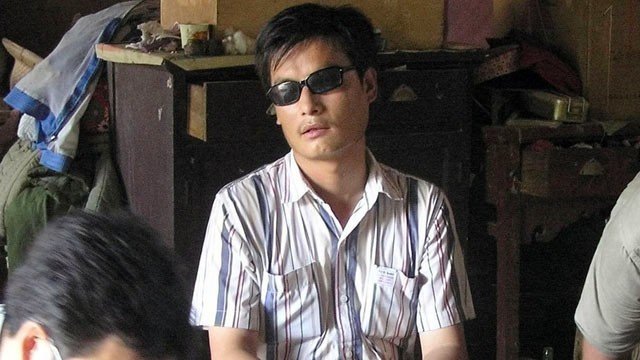
Chen Guangcheng has phoned a US Congressional hearing to plead for help in his attempts to leave China with his family
Although he initially said he wanted to stay in China, Chen Guangcheng said he had changed his mind because he believed China had reneged on an agreement to guarantee his safety.
There is no official confirmation about the nature of any such agreement, but media reports from the US suggest that Chen Guangcheng had been promised safety in a university town elsewhere in China.
The case has increasing political resonance in the US.
Republican presidential candidate Mitt Romney said if reports that US officials had persuaded Chen Guangcheng to leave the embassy were true “this is a dark day for freedom and it’s a day of shame for the Obama administration”.
White House spokesman Jay Carney said President Barack Obama was “not concerned about political back-and-forth on this issue”.
Jay Carney said: “He is focused on the need to advance US interests in our broad-based relationship with China… He has and will continue to make a priority in that relationship or a part of that relationship an open and frank discussion of our concerns about human rights.”
The US has said that at no point did Chen Guangcheng ask for asylum and he was never put under any pressure to leave the embassy.
State department spokesman Mark Toner said there had only been telephone access to Chen Guangcheng on Thursday, adding: “It’s our desire to meet with him [on Friday] or in the coming days. But I can’t speak to whether we’ll have access to him. I just don’t know.”
Hillary Clinton and Treasury Secretary Timothy Geithner are in Beijing for annual bilateral talks, focusing heavily on Syria and North Korea.
As the talks opened, Hillary Clinton did not mention Chen Guangcheng by name but addressed the topic of human rights.
“The United States believes that no state can legitimately deny the universal rights that belong to every human being – or punish those who exercise them,” she said.
Chinese officials on Wednesday accused the US of interference in China’s domestic affairs and demanded an apology for housing Chen Guangcheng at the US embassy.
Chen Guangcheng had been at the embassy for almost a week after escaping from house arrest in his village in Shandong.
He had planned his escape from house arrest for months. On 27 April, Chen Guangcheng scaled the wall the authorities had built around his house and was then driven hundreds of miles to Beijing.
ABC News quoted US officials as saying an embassy vehicle drove out to meet a car carrying Chen Guangcheng, but the staff realised they were being followed. The two cars met hurriedly in an alleyway and Chen Guangcheng was bundled into the US car and driven back to the embassy, ABC said.
Several people involved in Chen Guangcheng’s escape have been detained or have disappeared in recent days.
He has spent seven years in prison or under house arrest after he exposed human rights abuses, including the way thousands of women were forced to have abortions under China’s “one-child-policy”.
[youtube pkW-0Ud86lw]
Chinese activist Chen Guangcheng says he has been unable to meet US officials to discuss his desire to leave the country.
The blind dissident, in hospital in Beijing, says he believes Chinese officials were preventing US envoys from visiting him on Thursday.
After he escaped house arrest last week, Chen Guangcheng spent six days in the US embassy before emerging on Wednesday.
The issue continues to overshadow key talks between the US and China.
US Secretary of State Hillary Clinton is in Beijing to attend talks focusing on North Korea and Syria.
As the talks opened, Hillary Clinton did not mention Chen Guangcheng by name but addressed the topic of human rights.
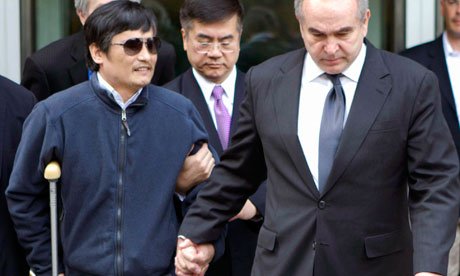
Chinese activist Chen Guangcheng says he has been unable to meet US officials to discuss his desire to leave the country
Earlier, the US ambassador to China, Gary Locke, rejected the suggestion that Chen Guangcheng had been pressured into leaving the US embassy.
“I can tell you unequivocally that he was never pressured to leave. He was excited and eager about leaving,” he said.
However, Chen Guangcheng says since he left he has been made aware of threats made to his wife and family while he was in the embassy.
“She told me our house has been installed with seven CCTV cameras inside the courtyard. There are people in and outside of our house and on the roof…They just eat and stay in our house, and they plan to build up electric wires around my house,” he said.
Although he initially said he wanted to stay in China, Chen Guangcheng changed his mind because he believes China has reneged on an agreement to guarantee his safety.
There is no official confirmation about the nature of any such agreement, but media reports from the US suggest that Chen Guangcheng had been promised safety in a university town elsewhere in China.
Chen Guangcheng also said that US officials had been to the hospital where he is currently receiving treatment, but he had not seen them. He believes Chinese foreign ministry officials are not letting them in.
“Yesterday afternoon I thought they [US officials ] left. I looked for them, but couldn’t find them…Today I got to know that they were prevented from coming in, not that they are not coming in,” he said.
A Chinese foreign ministry spokesman said he had “no information” on Chen Guangcheng’s request to leave China.
Both Hillary Clinton and US Treasury Secretary Timothy Geithner are attending the annual two-day talks, which had been expected to focus on North Korea and Syria.
Hillary Clinton has previously expressed her support for Chen Guangcheng, who has been held under house arrest for almost two years.
As the talks opened, she addressed the topic of human rights.
“The United States believes that no state can legitimately deny the universal rights that belong to every human being – or punish those who exercise them,” the top US diplomat said.
President Hu Jintao, also speaking at the start of the talks, said it was not possible for China and the US to see “eye to eye on every issue”.
Chinese officials on Wednesday accused the US of interference in their domestic affairs and demanded an apology for housing Chen Guangcheng at the embassy.
Chen Guangcheng had been at the US embassy for almost a week after escaping from house arrest in his home village in the eastern province of Shandong.
He had planned his escape from house arrest for months. On 27 April, he scaled the wall the authorities had built around his house and was then driven hundreds of miles to Beijing.
The activist spent seven years in prison or under house arrest after he exposed human rights abuses, including the way thousands of women were forced to have abortions under China’s “one-child-policy”.
Several people involved in Chen Guangcheng’s escape have been detained or have disappeared in recent days.
Chinese activist Chen Guangcheng has left the US embassy in Beijing, a week after seeking shelter following his escape from house arrest.
State news agency Xinhua said Chen Guangcheng left “of his own volition”. He is having a check-up at a Beijing hospital. His lawyer said he was “happy” and “free”.
The announcement came as US Secretary of State Hillary Clinton arrived in China for high-level annual talks.
Hillary Clinton said Chen Guangcheng’s departure “reflected his choices and our values”.
“The United States government and the American people are committed to remaining engaged with Mr. Chen and his family in the days, weeks, and years ahead,” Hillary Clinton said in a statement.
Chen Guangcheng’s case threatened to overshadow the talks, which are due to focus on issues like Syria and trade.
US officials were said to have been in talks with their Chinese counterparts ahead of the announcement.
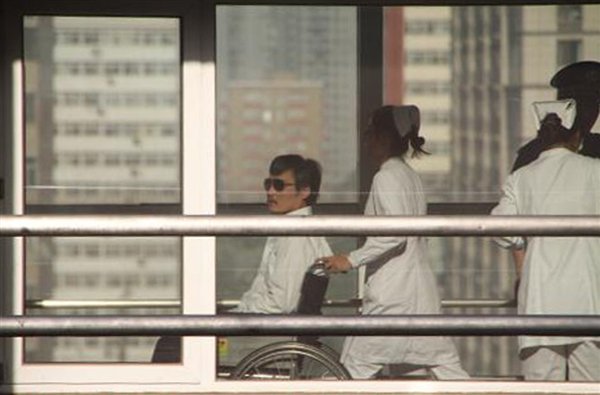
Chen Guangcheng is having a check-up at a Beijing hospital after he left US embassy
After leaving the US embassy, the Chinese dissident had a telephone call with Hillary Clinton in which he said: “I want to kiss you.”
Chen Guangcheng’s lawyer Li Jinsong said he had spoken to his client on the phone. He said Chen Guangcheng was “very happy and wants to hug all his friends”. Li Jinsong said the dissident had told him he now had “true freedom”, his rights were now protected by the national law and he was “a free citizen”.
Chen Guangcheng’s wife said she and their two children were well.
A US official said Chen Gunagcheng was to stay in China where he had been promised a “safe” place.
Neither Beijing nor Washington had confirmed Chen Guangcheng’s whereabouts.
The US official, who wanted to remain anonymous, said the dissident had gone into the embassy because he needed medical care and had not requested political asylum.
“China acknowledged that Mr. Chen will be treated humanely while he remains in China,” the official said.
“When he leaves the hospital, the Chinese authorities have stated that Mr. Chen and his family will be relocated to a safe environment so that he may attend a university to pursue a course of study,” he said.
“This was an extraordinary case involving exceptional circumstances, and we do not anticipate that it will be repeated,” the official said.
Chinese foreign ministry spokesman Liu Weimin earlier said Chen Guangcheng had been taken into the US embassy “via abnormal measures” and the Chinese authorities were “strongly dissatisfied”.
Chen Guangcheng, who has been blind since childhood, has long been a high-profile figure and international rights groups have frequently expressed alarm at the treatment of him and his family.
He was placed under house arrest in 2010 after spending more than four years in jail for disrupting traffic and damaging property.
Chen Guangcheng exposed how local authorities in Linyi, in Shandong province, forced thousands of women to have abortions or be sterilized as part of China’s one-child policy
His colleagues said the escape from house arrest had taken months to plan, and was carried out with the help of a network of friends and activists.
Chen Guangcheng scaled the wall that the authorities had built around his house, and was driven hundreds of miles to Beijing, where activists say he stayed in safe houses before fleeing to the embassy.
Several people involved in Chen Guangcheng’s escape have been detained or have disappeared in recent days.
New reports say Chinese authorities have begun to round up relatives and associates of blind activist Chen Guangcheng, who fled from house arrest last week.
Several people involved in Chen Guangcheng’s escape have been detained or have disappeared in recent days, and fellow activist Hu Jia is being questioned.
Chen Guangcheng, 41, is believed to be sheltering at the US embassy in Beijing.
The US and international rights groups have frequently expressed alarm at the treatment of Chen Guangcheng and his family.
US Secretary of State Hillary Clinton, who has demanded his release in the past, is due in China this week for a previously arranged meeting which is now likely to be overshadowed by Chen Guangcheng’s case.
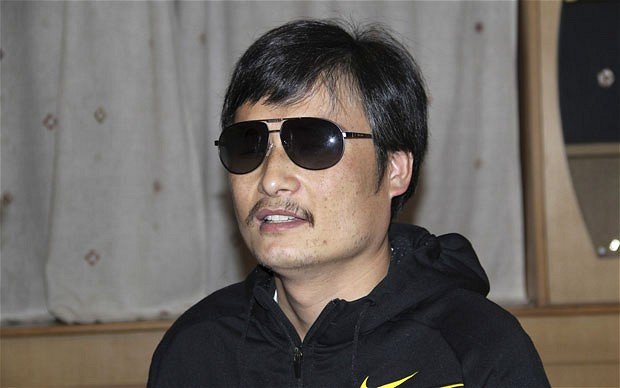
Chinese authorities have begun to round up relatives and associates of blind activist Chen Guangcheng, who fled from house arrest last week
The US government has not so far commented publicly on the whereabouts of Chen Guangcheng.
Analysts say the issue will be highly sensitive for both sides, and will not be easy to resolve.
If Chen Guangcheng is in the embassy, his case will raise memories of an incident in 1989 when another prominent activist, Fang Lizhi, fled to the US mission in Beijing.
He remained there for more than a year while the two sides attempted to broker a deal.
Chen Guangcheng was placed under house arrest in 2010 after spending more than four years in jail for disrupting traffic and damaging property.
He had exposed how local authorities in Linyi, Shandong province, forced thousands of women to have abortions or be sterilized as part of China’s one-child policy.
His colleagues said last Sunday’s escape had taken months to plan, and was carried out with the help of a network of friends and activists.
Chen Guangcheng scaled the wall that the authorities had built around his house, and was driven hundreds of miles to Beijing, where activists say he stayed in safe-houses before fleeing to the embassy.
His wife and six-year-old daughter remain under house arrest, but several of his family members have been detained and others are being sought by the authorities.
One of Chen Guangcheng’s friends, He Peirong – who wrote on her microblog that she had driven him to Beijing – is believed to have been detained in the city of Nanjing.
“I was actually talking to her and the last words she said were <<the PSB [Public Security Bureau] has arrived>>,” said Bob Fu, of the US-based ChinaAid pressure group.
He Peirong’s microblog was later deleted, and all searches on popular microblogging sites for Chen Guangcheng’s name and other related terms were being blocked by the censors.
On Saturday, the authorities detained Hu Jia, who had earlier said how he had met Chen Guangcheng since his escape.
Hu Jia’s wife, Zeng Jinyan, said late on Saturday that her husband’s detention had been extended for a further 24 hours.
“I asked where Hu Jia would sleep, they said on a chair,” Zeng Jinyan said.
The fate of other associates of Chen Guangcheng also remains unclear, with reports claiming several have disappeared.
The treatment of Chen Guangcheng and his family by local authorities has long been controversial.
Amnesty International regards him as a “prisoner of conscience” and has called on the authorities to end the “shameful saga” of his detention.
Blind Chinese dissident Chen Guangcheng is in the US embassy in Beijing following his dramatic escape from house arrest, said activist Hu Jia.
Hu Jia said Chen Guangcheng had scaled a high wall and was driven hundreds of kilometres to Beijing.
Other, unconfirmed, reports say Chen Guangcheng is under “US protection” while talks take place with Chinese officials.
Chen Guangcheng escaped on Sunday, activists say, and has since released a video addressed to Prime Minister Wen Jiabao.
There are reports that his brother and nephew have now been held by police.
The rights group Human Rights in China quoted a source, who knew about Chen Guangcheng, and said his nephew Chen Kegui was taken away from his home by more than 30 police officers.
Chen Guangcheng’s escape complicates already tricky relations between China and the United States and could overshadow a visit to Beijing next week by US Secretary of State Hillary Clinton. She has repeatedly called for the dissident’s release.
The US state department has refused to comment on the claim that Chen Guangcheng is in its embassy. The US embassy in Beijing has also not commented.
In the latest development, the Texas-based ChinaAid group released a statement on Saturday saying it had “learned from a source close to the Chen Guangcheng situation that Chen is under US protection” in Beijing.
“High-level talks are currently under way between US and Chinese officials regarding Chen’s status,” said the group, which is led by Bob Fu, an American-based human rights campaigner and friend of Chen Guangcheng.
UN human rights chief Navi Pillay said she was concerned for the wellbeing of Chen Guangcheng and his family, who live in Dongshigu town, Shandong province.
“I’m disturbed to hear reports that other family members, including his brother Chen Guangfu and nephew Chen Kegui, have now been detained,” she said in a statement.

Unconfirmed reports say Chen Guangcheng is under "US protection" while talks take place with Chinese officials
Blogger Yaxue Cao says he spoke to Chen Kegui on Friday at about 01:30 local time, and he has transcribed the interview on his blog Seeing Red in China.
The transcript suggests that at the time of the interview Chen Guangfu had already been detained.
Chen Kegui was awaiting police arrest, having initially resisted an attempt to detain him by unidentified men less than two hours before by slashing at them with kitchen knives.
“Around midnight, about two hours ago, they entered our property by jumping over the enclosed walls, they pried open the locks and kicked on the doors. I heard my mother crying inside, helplessly: <<Please don’t come in! Please don’t come in!>>”
Chen Kegui, who often sobs during the interview, insists: “I did not take knives to go out to kill anyone. I was defending myself in my own home. They attempted to apprehend me without showing any warrant.”
The interview ends with Chen Kegui saying: “I don’t know whether the police are coming. Perhaps they will send a sniper to kill me. They would accuse me of killing. It’s all possible.”
Chen Guangcheng, 40, was placed under house arrest after being released from a four-year jail sentence in 2010. Reports suggest authorities only realized he had escaped on Thursday.
Hu Jia – a friend of Chen Guangcheng and himself a prominent activist and dissident – said he had met him in the last 72 hours, since his escape.
He said Chen Guangcheng had fled to the US embassy in Beijing.
In his video addressed to Prime Minister Wen, delivered from a darkened room, Chen Guangcheng said outwitting his guards had not been easy.
In the appeal, posted online by Boxun, a Chinese dissident news website based in the United States, he asks that:
• Prime Minister Wen investigate and prosecute local officials Chen Guangcheng says beat up his family members
• The safety of his family be ensured
• Corruption in general in China be dealt with and punished according to the law
The Chinese authorities have come under international criticism for their treatment of him. At one point his daughter was barred from school. Many sympathizers who have tried to visit his home say they have been beaten up.
A self-schooled legal activist, Chen Guangcheng is known for revealing rights abuses under China’s one-child policy and has accused officials in Shandong province of forcing 7,000 women into abortions or sterilizations.
He Peirong, another China-based activist who had also campaigned for Chen Guangcheng, has also been detained at her home in Nanjing according to other activists.
The Chen affair comes at an unwelcome time for China’s leaders, who have been embroiled in a lurid political scandal involving disgraced former party boss Bo Xilai.
Chen Guangcheng
• Born 12 November 1971
• Nickname: The Barefoot Lawyer
• Went blind as a child
• Campaigned for women forced to have abortions or sterilization under China’s one child per family policy
• Jailed for four years in 2006 for disrupting traffic and damaging property
• Released from jail in 2010 placed under house arrest
• Daughter barred from school during much of 2011, reports say
• Escapes house arrest, April 2012
Chen Guangcheng, a blind lawyer and one of China’s best known dissidents, has escaped from the house arrest.
Rights activists say Chen Guangcheng slipped out of his home in Dongshigu town in Shandong province on Sunday.
Chen Guangcheng’s exact whereabouts cannot be verified at the moment but human rights campaigners said they believe he has fled from Shandong province.
He has been under house arrest since he was released from jail in 2010.
Activist He Peirong, who has been campaigning for his freedom, told various sources that she drove him to “a safe place” outside Shandong.

Rights activists say Chen Guangcheng slipped out of his home in Dongshigu town in Shandong province on Sunday
There are also unconfirmed rumors that Chen Guangcheng, who is blind, is at the US Embassy in Beijing.
The US embassy ”would not comment”, says an Associated Press news report.
In the same report, He Peirong denied the rumors published in Singapore’s Lianhe Zaobao newspaper, saying that she had spoken to people at the embassy.
“I can tell you he’s not at the US embassy, and he’s not in Shandong,” she told AP.
An activist based in the US who has been in close contact with Chen Guangcheng confirmed that the dissident had left Shandong.
”He was able to get out of his home on 22 April and his friends… escorted him to a safe location outside of [his home province of] Shandong,” Bob Fu told the AFP news agency.
Chen Guangcheng, who has been under house arrest for almost 20 months, is known as ”the blind lawyer”.
He lost his sight in childhood. He has no formal legal training as the blind were not permitted to attend college.
He is known for revealing rights abuses under China’s one-child policy and has accused officials in Shandong province of forcing 7,000 women into abortions or sterilisations.
Chen Guangcheng has also advised farmers in land disputes and campaigned for improved treatment of the disabled.
The plight of Chen Guangcheng has become famous around the world, and the US Secretary of State Hillary Clinton has repeatedly called for his release and is due to visit Beijing next week.












